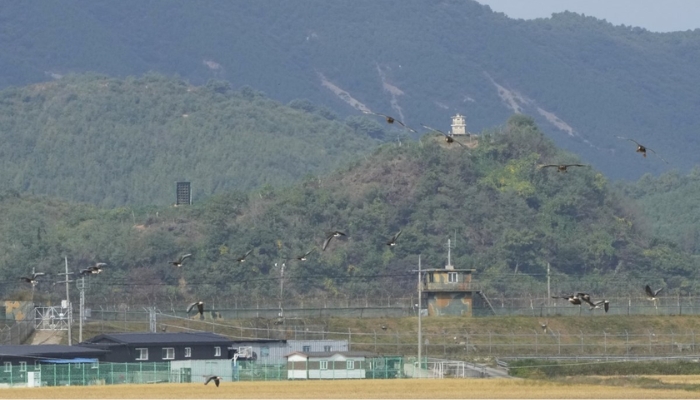North Korea is preparing to damage the northern parts of inter-Korean roadways, Seoul claims

In a recent development, tensions on the Korean Peninsula have further escalated as South Korea claims that North Korea is preparing to damage parts of the inter-Korean roadways located in the northern regions of the Korean Demilitarized Zone (DMZ). These roads, once symbols of cooperation and diplomacy, have been unused for years, but their symbolic significance remains high in light of inter-Korean relations. The destruction of these roadways would mark a significant step backward in reconciliation efforts and potentially heighten the already strained relations between the two Koreas.
Rising Tensions: The Background
The Korean Peninsula has been the scene of heightened tensions for years, particularly in the last decade, with numerous confrontations between North and South Korea. Despite various attempts at peace talks, the situation has worsened, with North Korea conducting frequent missile tests and maintaining a militaristic stance toward both South Korea and its ally, the United States.
South Korea’s military reported on October 14, 2024, that it had detected signs of North Korea preparing to demolish portions of inter-Korean roads located in the northern regions of the peninsula. These roads, which have remained unused since inter-Korean ties deteriorated, were initially built as part of broader efforts to promote dialogue and cooperation between the two Koreas. Their destruction would likely further erode hopes for future diplomatic engagement.
Stay ahead! SavingGain brings news, info, tips & entertainment. Your daily dose of knowledge & fun!
The Alleged Drone Incident
This latest development follows accusations by North Korea that South Korea sent drones over its territory, allegedly to drop propaganda leaflets on several occasions throughout October. North Korea’s government responded with heated rhetoric, issuing a stern warning that it would retaliate if such actions continued. They have claimed that South Korean drones entered their airspace three times in recent weeks. These allegations have been firmly denied by South Korea, which in turn has warned that it will take swift measures to protect its citizens if any North Korean provocations put them at risk.
A Prelude to Military Action?
According to reports, North Korea’s Defense Ministry stated that their military had issued operational orders to artillery units near the DMZ, advising them to remain prepared to fire upon provocation. The statement from North Korea also implied that Seoul might face severe consequences, including the possibility of a military strike that could “turn South Korea into piles of ashes” if they perceived further infringements on their sovereignty.
For South Korea, this rhetoric, coupled with the destruction of inter-Korean infrastructure, represents a serious escalation. The South Korean military remains on high alert, closely monitoring activities in the North. While Seoul has sought to avoid any direct military confrontation, it has reiterated its commitment to responding forcefully should North Korea’s actions threaten the security of its people.
The Symbolism of the Inter-Korean Roads
The roads in question were developed during periods of relatively warmer relations between the two Koreas. They were meant to facilitate transport and commerce as part of a broader initiative to enhance economic cooperation and political engagement. Although they have not been in use for some time, these roads still stand as a reminder of what seemed to be a potential path toward reconciliation.
However, North Korea’s decision to damage these roads highlights its increasingly hostile stance toward the South. The roads’ destruction could signify an attempt to signal to the international community that North Korea has no intention of returning to peace talks or cooperation. Moreover, it adds to a series of provocative actions that seem designed to provoke a reaction from both South Korea and the United States, possibly aiming to bring them back to the negotiation table on North Korea’s terms.
Diplomatic Implications
North Korea’s moves are likely to complicate diplomatic efforts in the region. The destruction of inter-Korean infrastructure is a symbolic but powerful gesture that could affect regional stability. South Korea and its allies, particularly the U.S., have already condemned North Korea’s missile launches and weapons testing programs. This new development could push them to reevaluate their diplomatic strategies toward the North.
At the international level, North Korea’s actions have often been seen as attempts to gain leverage in negotiations, typically to reduce sanctions and gain economic aid. By raising tensions in the region, Pyongyang may be attempting to extract concessions from South Korea and the U.S. without engaging in full-scale conflict. However, with the current level of hostility and the destruction of symbolic roadways, the space for diplomatic maneuvering seems increasingly limited.
What’s Next?
The destruction of the northern sections of the inter-Korean roads could prompt South Korea to take firmer measures in response. This might include increased military preparedness, additional sanctions, or new diplomatic efforts aimed at securing the support of key allies such as the United States, Japan, and members of the United Nations Security Council. At the same time, South Korea will likely attempt to avoid any actions that could trigger a full-blown military conflict, as the stakes are extremely high.
Given North Korea’s track record of unpredictable behavior, it remains unclear whether this move is simply part of its ongoing strategy of brinkmanship or whether it signals a shift toward a more aggressive posture. The international community will undoubtedly be watching closely to see how the situation unfolds, especially considering the region’s geopolitical significance.
Conclusion
The latest claims from Seoul that North Korea is preparing to damage northern sections of the inter-Korean roadways mark yet another chapter in the long history of tensions between the two Koreas. While the roads themselves may no longer serve a functional purpose, their destruction symbolizes a significant regression in relations. North Korea’s actions, particularly in the context of accusations involving drone flights and potential military retaliation, indicate a worrying trend toward escalation that could further destabilize the Korean Peninsula.
As these developments continue to unfold, the importance of diplomatic intervention and strategic patience cannot be overstated. For both South Korea and the wider international community, the challenge will be in managing the delicate balance between maintaining security and avoiding actions that could lead to unintended conflict. All eyes will now be on the Korean Peninsula as the situation remains tense and unpredictable.








